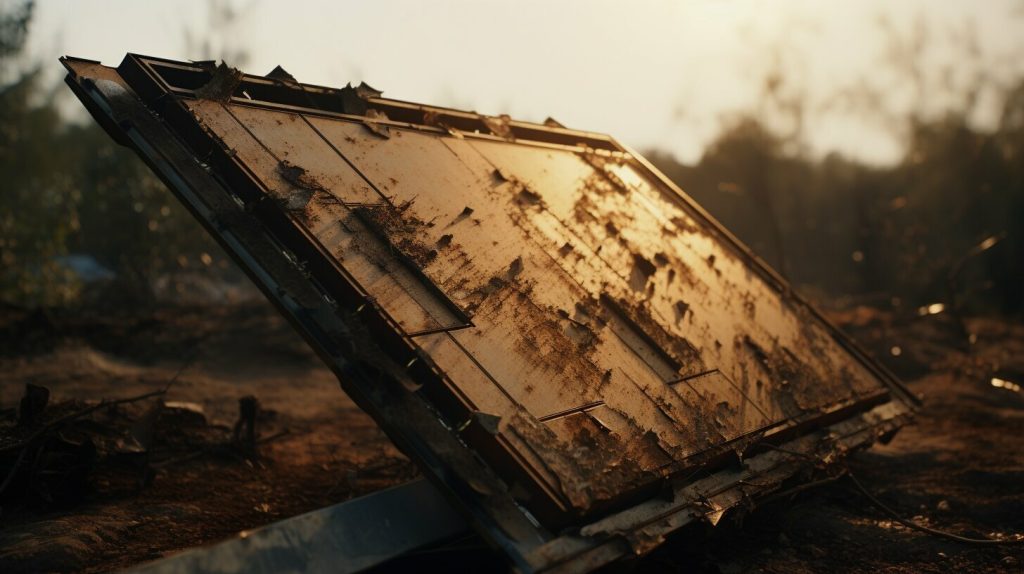If you are experiencing a lack of electricity production from your solar panel, you are not alone. There are a variety of reasons why solar panels may not be functioning optimally, even with proper installation and maintenance.
In this guide, I will cover common reasons your solar panel is not working and provide solutions and tips for troubleshooting.
Important Points To Consider:
- Regular maintenance is crucial for optimal solar panel performance.
- Installation and wiring issues can impact solar panel functionality.
- Shading and obstructions can reduce the amount of sunlight reaching the panels.
- Electrical problems and faulty components can result in underperformance.
- Cleaning and care can prevent future issues.
- Diagnosing and fixing solar panel problems requires a systematic approach.
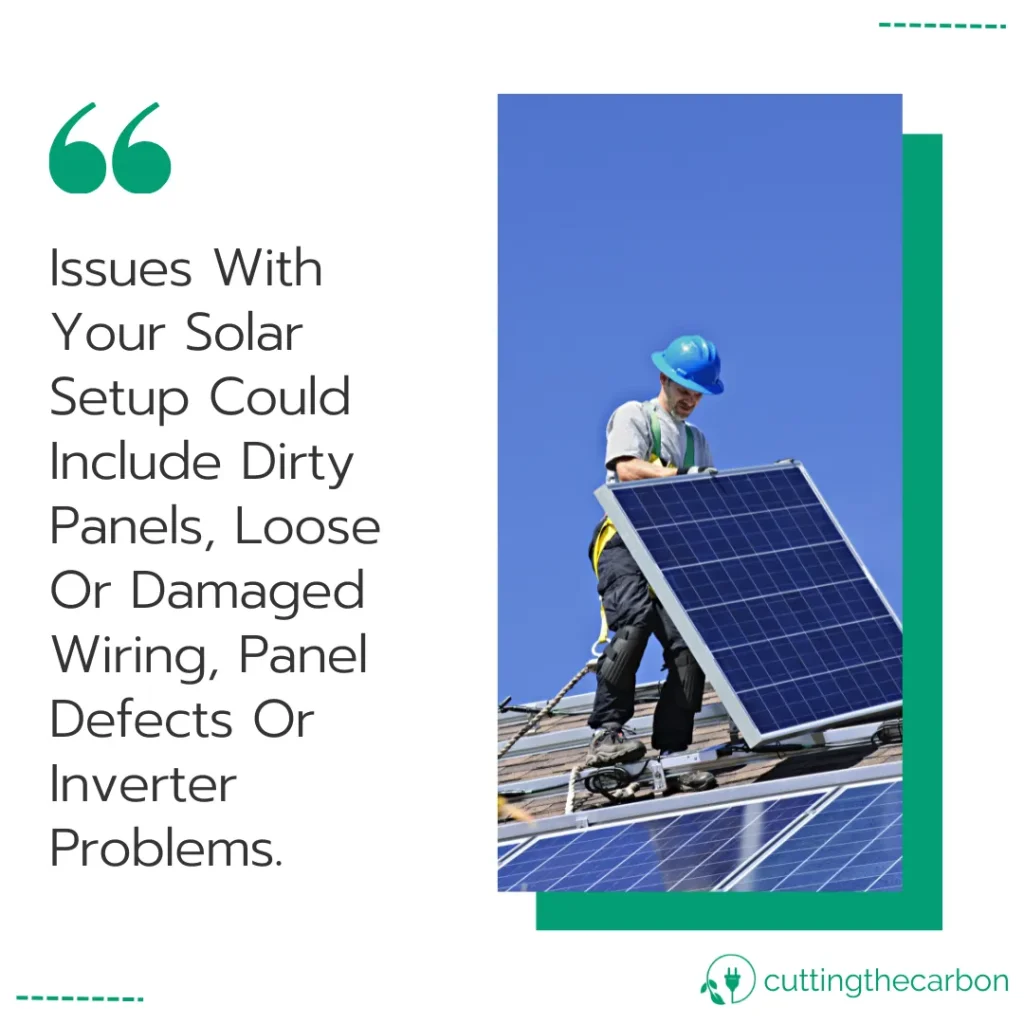
Common Solar Panel Maintenance Issues
Regular maintenance is key to ensuring optimal solar panel performance.
Here are some common maintenance issues to be aware of:
| Maintenance Issue | Description | Solution |
|---|---|---|
| Dirty Panels | Dirt and debris buildup on panels can lead to reduced output. | Clean panels regularly using a soft brush or sponge and non-abrasive cleaner. Avoid using hot water or high-pressure sprays. |
| Loose or Damaged Wiring | Wiring can loosen or become damaged, leading to power loss. | Inspect wiring regularly and tighten any loose connections. Replace any damaged wires. |
| Panel Defects | Manufacturing defects can impact panel performance. | Check for panel defects and contact the manufacturer if necessary. If still under warranty, repairs or replacements may be covered. |
| Inverter Problems | The inverter is responsible for converting DC to AC electricity and can malfunction. | Check the inverter regularly and replace if faulty. Hire a professional electrician for complex repairs. |
It’s important to note that some solar panel warranty coverage may be affected if regular maintenance is not performed. Regular cleaning and inspection can help detect and prevent issues before they become more serious.
Installation Problems and Wiring Issues
In addition to regular maintenance and cleaning, solar panel functionality can be impacted by various installation wiring issues that can hamper electricity production.
A properly installed solar panel system that is wired correctly is essential for maximum power output and proper operation.
Problems with the installation of solar panels can lead to a range of issues, such as failure to produce enough electricity, damage to the system, or even complete system failure.
Solar Panel Installation Issues
If your solar panel system is not working correctly, one of the first areas to investigate is the installation of your system. Ensure that your solar panels are correctly mounted and aligned on your roof or on the ground.
Check for any obstructions blocking the sun, such as trees or nearby buildings, and remove any items causing shading.
Additionally, inspect the mounting hardware to ensure it is secure and properly anchored. Faulty mounting can cause the panels to shift or even detach from their mounting points in high winds, which can cause damage to the system and a reduced kWp power output.
If you are not comfortable checking your mounting hardware, consider hiring a professional solar panel installation company to evaluate your system.
Why Have My Solar Panels Stopped Working Video
Solar Panel Wiring Issues
Another common issue that can impact the performance of a solar panel system is wiring problems. Ensure that all wires are connected correctly and securely.
Check for any loose connections or any damaged wires. Ensure that all electrical connections are clean and free of corrosion or rust, which can cause electrical resistance, overheating, and damage to the system.
The inverter is one of the most critical components of a solar panel system. It converts the DC electricity the panels generate into AC electricity used in your home or business. Check for any issues with the inverter, such as error codes or failed components, and replace or repair them if necessary.
Pro Tip:
When troubleshooting solar panel wiring issues, always turn off the power to your solar panel system before attempting any repairs or maintenance. This will prevent electrical shock or other injuries.
Proper installation and wiring are critical to ensuring optimal solar panel performance. If you are unsure about the integrity of your wiring or the installation of your solar panel system, it is recommended that you contact a professional to evaluate your system and perform any necessary repairs or maintenance.
Shading and Obstructions
Shading and obstructions can be a major issue for solar panels, impacting the amount of sunlight they receive and reducing efficiency. If a small part of a solar panel is shaded, it can significantly reduce power output.
Some common causes of shading and obstructions include nearby trees or buildings, chimneys, power lines, or other objects that cast shadows on the panels.
If you suspect shading may be an issue, conducting a shading analysis before installing your panels is important. This can help you identify potential shading sources and determine the best placement for your panels.
If you already have solar panels installed and suspect shading may be causing issues, there are a few things you can do to minimise the impact:
- Trim back any trees or vegetation that may be casting a shadow on the panels
- Adjust the tilt angle of the panels to maximise exposure to sunlight
- Consider using micro-inverters or power optimisers to help mitigate the impact of shading on individual panels
Remember that shading issues may be more prevalent during certain times of the day or year, so monitoring your panels regularly and adjusting as necessary is important.
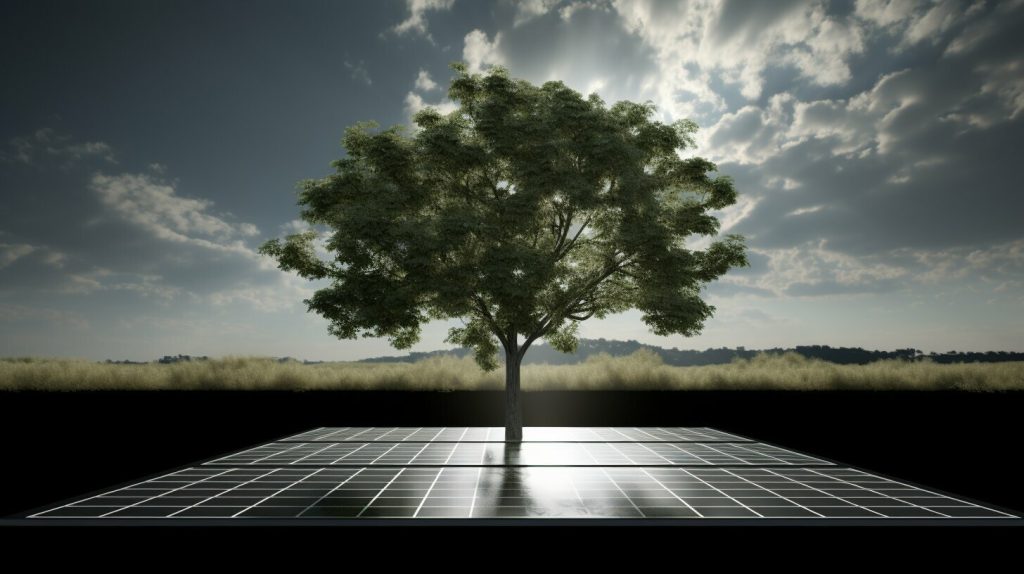
Electrical Problems and Faulty Components
If your solar panels are not producing the expected amount of electricity, it could be due to electrical problems or faulty components. Various factors, including wiring issues, module defects, or inverter failure, can cause this.
It’s important to take caution when working with electrical systems and seek professional help if unsure.
One common electrical problem is low voltage, which loose or corroded connections or wiring issues can cause. Inverter failure can also lead to power loss, meaning that the energy produced by the solar panels cannot be converted into usable electricity.
Module defects can also impact solar panel performance, particularly if the cells are damaged or worn. This can affect the panel’s ability to generate electricity and may require the replacement of the affected modules.
If you suspect that there is a fault with your solar panel, it’s important to contact the manufacturer or a qualified technician for advice.
If your solar panels are still under warranty, you may be able to have them repaired or replaced free of charge.
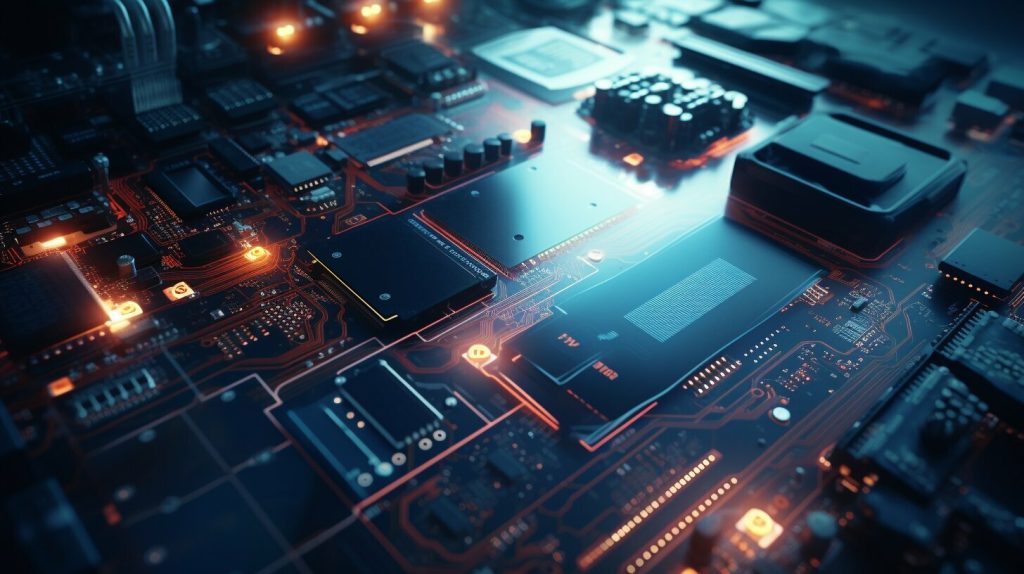
When dealing with electrical problems or faulty components, it’s crucial to approach the issues systematically and carefully.
First, check the wiring and connections to ensure everything is secure and free from damage or corrosion. If this doesn’t resolve the problem, consider checking the module(s) for damage or defects.
If you’re still experiencing problems, contacting a qualified electrician or solar panel technician may be necessary to troubleshoot and fix the issue.
Solar Panel Cleaning and Care
Regular solar panel maintenance is essential to ensure optimal performance and longevity. By keeping your panels clean and well-cared for, you can improve their efficiency and extend their lifespan.
Here’s what you need to know about solar panel cleaning and care:
First, it’s essential to understand the importance of safety when working with electrical systems. Always turn off the system and disconnect it from the grid before cleaning or performing any maintenance tasks.
To clean your solar panels, gently spray them with water using a hose or a pressure washer on a low setting. Avoid using abrasive materials or harsh chemicals, which can damage the panels. You can also use a soft brush to remove any debris or dirt.
In addition to cleaning your solar panels, regularly inspecting them for any defects or damage is important. Check for cracks, scratches, or any other signs of wear and tear that may require repair or replacement.
Finally, make sure your solar panels are well-ventilated to prevent overheating. This means keeping the area around them clear of obstructions and ensuring adequate airflow.
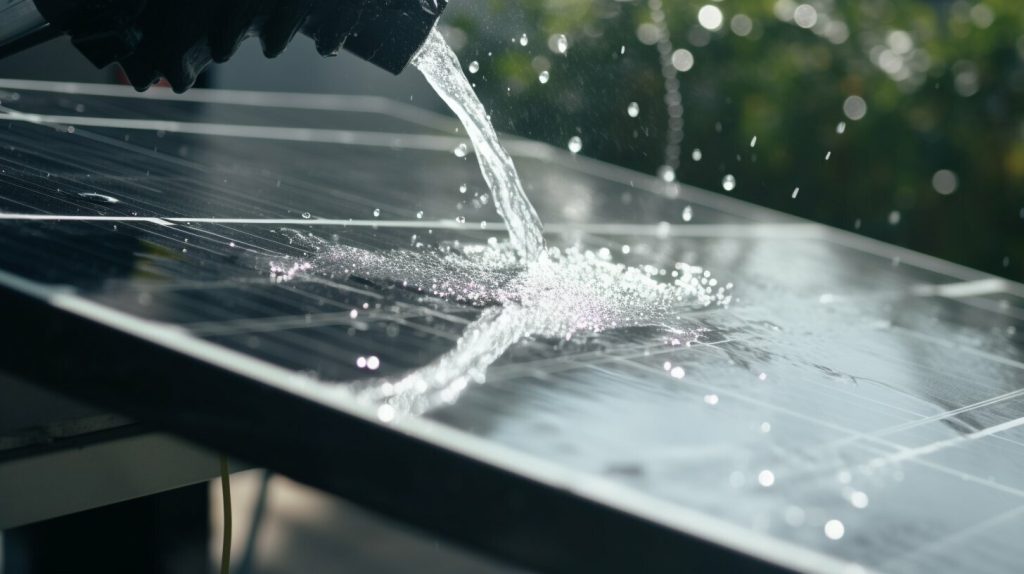
By following these simple cleaning and care tips, you can keep your solar panels functioning at their best and avoid common problems affecting their performance. Regular maintenance is key to a successful solar energy system, so keep up with it to enjoy maximum efficiency and savings.
Diagnosing Solar Panel Problems
Identifying the root cause of solar panel problems can be challenging, but a systematic approach can make it easier.
Here are some steps to diagnose solar panel issues:
- Check your inverter: The inverter converts DC electricity produced by the panels to usable AC electricity. If the inverter is not functioning correctly, it can cause various issues. Check the inverter display for error messages or faults. Refer to the inverter manual for troubleshooting tips.
- Inspect the panels: Check the physical condition of the panels for signs of damage, such as cracks, discolouration, or warping. If any panels are damaged, they may need to be replaced.
- Monitor energy production: Keep track of the amount of energy your panels produce. If you notice a significant drop in electricity production, it may indicate a problem with the panels, wiring, or inverter.
- Check for shading: Shade can significantly impact the performance of solar panels. Check for obstructions such as nearby buildings, trees, or structures blocking sunlight. If shading is the issue, consider trimming nearby trees or adjusting the panel positioning.
- Inspect wiring: Check the wiring for any signs of wear, damage, or loose connections. Faulty wiring can cause power loss or even create a safety hazard. If you suspect a wiring issue, contact a professional electrician to diagnose and repair the problem.
- Look for other potential causes: Other factors such as extreme weather, dirt or debris on the panels, or a malfunctioning meter can also impact solar panel performance. It’s important to thoroughly inspect all possible causes before attempting repairs.
By following these steps, you can identify and diagnose solar panel problems. If you’re unsure or uncomfortable with diagnosing the issue yourself, consider contacting a professional solar panel installer or electrician for assistance.
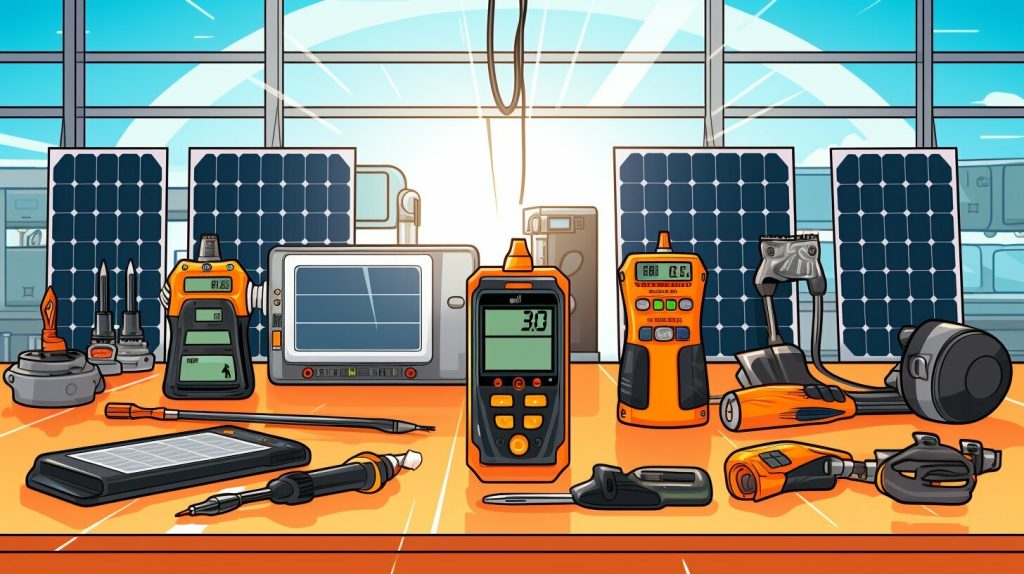
Other Reasons Your Solar Panels Might Not Be Working
PID Impact
Potential Induced Degradation (PID) has the potential to diminish the efficacy and output of your solar panels. This degradation not only affects the longevity of your panels but can also introduce complications to your entire solar setup. Addressing the PID impact on your solar infrastructure often requires expert intervention.
The onset of the PID impact is attributed to the voltage disparity between the solar panel and its grounding. This leads the main circuit of the system to generate intermittent voltage discharges.
Seek the expertise of a specialist to mitigate this issue.
To safeguard against the PID impact, consider integrating an anti-PID device. It’s advisable to incorporate this before any signs of degradation to ensure optimal panel health.
Micro-Fissures And Cracks
Tiny fissures or cracks can compromise the effectiveness and functionality of your solar setup. These minuscule fractures can hinder the consistent generation of electrical current for residential or commercial spaces. Notably, these fissures are often too subtle to be detected by the naked eye.
A prevalent issue that can disrupt your solar system’s operation is the presence of these cracks.
With the progression of time and fluctuating climatic conditions, these fissures can widen. Factors such as the production process of the PV module, seasonal shifts, and temperature variations can contribute to their formation.
Addressing this issue is crucial to ensure an uninterrupted power supply to your home or business premises.
It’s imperative to seek a specialist’s expertise to repair the fissures or recommend a panel replacement if necessary. Exercise utmost caution while handling your panels to prevent exacerbating the issue.
Substandard Installation
Errors or incorrect connections during the setup process can lead to the solar system not functioning optimally.
Hence, post-installation, it’s essential for the technician to guide you through the operational aspects of your solar equipment. Ensure its proper functioning before they depart.
To rectify such issues, it might be necessary to dismantle the entire system and seek reinstallation from a seasoned and certified expert.
Faulty Breaker Switching
Circuit breakers play a pivotal role among the various components in a solar system. They regulate the electrical current flowing from the system into your home or business. A compromised breaker can directly affect the power supply within your home.
Inspect the breaker panel to ascertain if the circuit breakers are the root cause of your solar system’s issues.
Ensure that none of the breakers are toggled to the ‘off ‘ setting.
If any are ‘off’, switch them to ‘on’ to restore a consistent electricity flow.
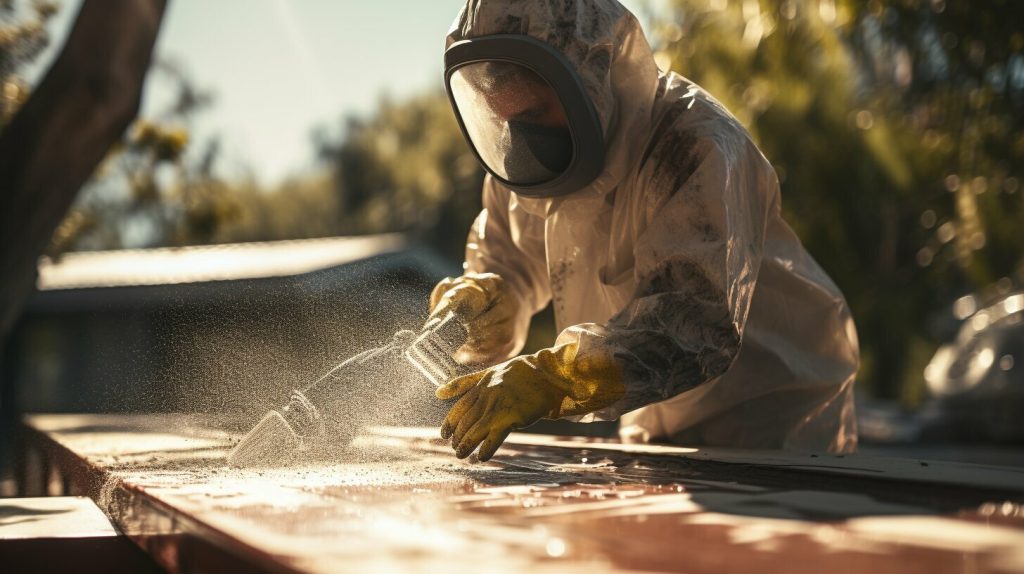
With these tips in mind, you should be able to diagnose and fix many common solar panel issues quickly. Remember, safety is always the top priority when working with electrical systems. Take every precaution necessary and consider hiring a professional if unsure about any step.
Final Thoughts
Dealing with solar panel issues can be frustrating, but with the right knowledge, you can resolve most problems independently. Regular maintenance, proper installation, and troubleshooting techniques are essential for optimal solar panel performance.
I hope this guide has provided valuable insights into common solar panel issues and how to solve them. By following the tips and solutions I’ve outlined, you can save time and money and enjoy the full benefits of your solar panel system.
If you encounter more complex issues or require professional assistance, don’t hesitate to contact a qualified solar panel technician. Their expertise can help you diagnose and solve any problems you may face.
Thank you for reading. I wish you success in maintaining and maximising your solar panel system’s energy production.
FAQs Relating To Solar Panel Problems And Solutions
Q: What are the common reasons my solar panel is not working?
A: There are several common reasons your solar panel may not work. Some of the most common issues include shading or obstructions, electrical problems or faulty components, installation problems and wiring issues, maintenance issues, and defects in the panel itself.
Q: How can I troubleshoot and identify why my solar panel is not producing electricity?
A: To troubleshoot and identify why your solar panel is not producing electricity, you can start by checking for any shading or obstructions that may be blocking sunlight from reaching the panels. You can also inspect the wiring and connections for any loose or damaged components. Additionally, ensuring regular maintenance and cleaning of the panels can help prevent issues and maximise performance.
Q: What common maintenance issues can affect solar panel performance?
A: Some common maintenance issues affecting solar panel performance include dust and dirt accumulation on the panels, bird droppings, and debris buildup. Regular cleaning and inspection can help prevent these issues and ensure optimal performance.
Q: What should I do if I encounter installation problems or wiring issues with my solar panel?
A: If you encounter installation problems or wiring issues with your solar panel, it is recommended to consult a professional solar panel installer or electrician. They can help identify and resolve any installation or wiring issues to ensure your panel functions correctly and safely.
Q: How does shading and obstructions impact solar panel performance?
A: Shading and obstructions can significantly impact solar panel performance as they block sunlight from reaching the panels. Even a small amount of shading can reduce the electricity a solar panel produces. It is essential to minimize shading and obstructions to maximize solar panel efficiency.
Q: How can I diagnose common solar panel problems?
A: To diagnose common solar panel problems, you can look for signs such as reduced electricity production, unusual noises, or flashing error codes on the inverter. You can also physically inspect the panels for any visible damage or loose connections. It is best to consult a professional for a thorough diagnosis if unsure.
Q: What steps can I take to fix common solar panel issues?
A: If you encounter common solar panel issues such as shading, electrical problems, or defects, you can take several steps to fix them. These include removing shading or obstructions, checking and tightening connections, cleaning the panels, or seeking professional assistance for more complex problems.

